15 best aquaculture courses are courses designed by experienced aquaculturists who have been in the field for decades. I have carefully selected them as a fish farmer myself to help you take your fish farm to the apex after successfully going through those courses.
There is a saying that “When a frog in front fall into a pitch, others behind take caution”. These individuals, through their back and front, have acquired and shared their experience in those causes. This will help you as a beginner because a Wiseman learns from his mistakes but the wisest man learns from the mistakes of others.
After purchasing those amazing courses, you will not only fall victim to your mistakes, but you will be able to learn and avoid those mistakes beforehand.
Follow the end of this post and learn more about why you should be enrolled in any of those courses, go through the courses and select the best that suits you.
Importance of Aquaculture Courses
You wanna know why you should be enrolled in any of the 15 best aquaculture courses? Then check out the reasons below;
1. Technical Knowledge
Fish farming, as part of aquaculture, is a technical and complex business that requires skills to be successful. This is because you are dealing with living things just like humans with emotions and feelings. There are certain avoidable mistakes that you can make a farmer and lose all your fish.
The 15 best aquaculture courses provide an in-depth understanding of fish biology, behavior, nutrition, and health.
This knowledge helps farmers in creating optimal conditions for fish growth and maximizing productivity.
2. Environmental Sustainability
Environmental pollution is a huge concern to environmentalists when it comes to the operations of fish farmers. And indeed, the activities of fish farmers actually depletes the environment when not properly managed.
Environmental effects of fish farmers include water pollution, land degradation, and air pollution. All these types of environmental pollution are caused by fish farmers.
So the courses cover sustainable practices such as water quality management, waste management, and ecosystem conservation.
This ensures that fish farming operations minimize negative impacts on the environment.
3. Disease Management
As I mentioned earlier, fish are living things with emotions and feelings therefore they are subjected to diseases and infections. Indeed diseases can destroy the entire fish population in your fish pond if not managed properly.
Understanding common diseases and their prevention is crucial in aquaculture. Therefore the 15 best aquaculture courses teach disease identification, prevention strategies, and treatment options, helping farmers maintain healthy fish populations.
4. Business Management
Aside from people who take fish farming as a hobby or ornamental, most fish farmers operate as a business. And if you are one of them, your ultimate goal is to be successful in your business, is that right? But you can’t also be successful in the business without proper business management. Therefore you need to take a course among the 15 best aquaculture courses to learn proper business management.
Aquaculture courses often include modules on business planning, marketing, and economics.
These skills are vital for running a successful fish farming operation, including budgeting, pricing, and market analysis.
5. Regulatory Compliance
How many fish farmers are aware that, before you operate a fish farm, you need to register and acquire necessary permits before? And those who are aware, how many of you have actually done that? How many fish farmers know the procedure for acquiring the necessary documents and permits? Some of the 15 best aquaculture courses teach you exactly that.
Courses familiarize farmers with legal requirements, certifications, and best practices to ensure compliance and minimize legal risks.
6. Innovation and Technology
In recent years, the emerged of technology in fish farming has taken the business to a different level. Some technological practices including the Recirculating Aquaculture Systems (RAS) and Automated Feeders.
Are you aware that, instead of wasting time to always feed your fish 24/7, you can easily put the feed in automated feeders and it will do that for you?
Are you aware that, instead of constantly changing your pond water, the RAS can easily filter and reuse the same water? There are causes in the 15 best aquaculture courses that shall teach you all that and even teach you how to simply make those equipment yourself by serving yourself the huge cost of purchasing them.
The courses expose farmers to the latest advancements in equipment, genetics, and farming techniques, enabling them to stay competitive and efficient.
7. Networking Opportunities
Participating in aquaculture courses allows farmers to connect with experts, researchers, and fellow farmers. This network provides valuable support, information exchange, and potential collaborations.
There is no way you can be successful alone in a business and fish farming is not an exception. From fish farm planning, pond construction, pond management, and all the way to harvesting and marketing, you need partners. The 15 best aquaculture courses will open your eyes to the best ways of sourcing productive business partners for success.
The 15 Best Aquaculture Courses
Now browse and read through the best 15 aquaculture courses to choose the one that suits you. The good news is that most of these courses are very affordable. It will also give you maximum returns therefore don’t hesitate to buy. This may be your chance of scaling up your fish farm.
1. ATOLL PRO: Aquaculture, Aquaponics, Zebrafish, and more
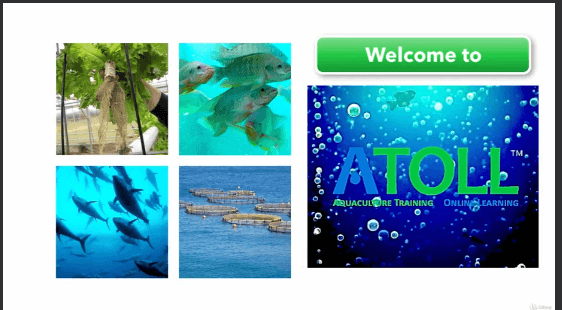
Get started growing healthy food by learning about aquaculture and aquaponics.
Course Description
“ATOLL: Aquaculture Training On-Line Learning” course features over 85 video lectures and quizzes covering:
- Fisheries today and the need for aquaculture
- History of aquaculture and animal husbandry
- Types of aquaculture systems
- The pet fish industry
- Water chemistry
- Measurements and Calculations
- Fish anatomy & physiology
- Fish health and biosecurity
- Fish nutrition
- Aquaculture Engineering
- Aquaponics – growing vegetables with fish tanks
- Starting an aquaculture business
- Zebrafish
- IMTA: Integrated Multi-Trophic Aquaculture
- How to get your aquatic medicine approved and more
2. Becoming Aquaculture Expert Part 1, 2, and 3
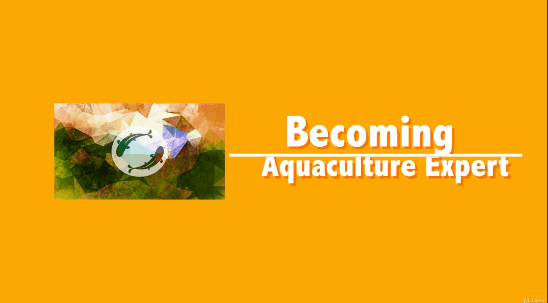
Course Description
Becoming an Aquaculture Expert (Part 1, 2, and 3) is the first step to realizing your ideas to produce fish sustainably. It is designed to provide an overview of aquaculture as the way to farm seafood sustainably and strategically.
This course contains lectures that include explanation videos followed by quizzes and related notes to help you test your understanding along the way. The notes will include references and links to additional resources of related knowledge.
Those completing the course will have a strong understanding of basic aquaculture concepts and general principles involved in aquaculture systems, which include pond, cage, recirculation aquaculture systems, raceway, and aquaponic.
Besides fish, there are a lot of other products available for you to choose from for commercial purposes or self-consumption. All of these products are highlighted in this course and available in printed form.
If you’re in the middle of choosing the right location for your aquaculture farm, this course will direct you to the appropriate factors that need to be considered before purchasing the piece of land for your farm.
If you’re thinking about the future of protein demand, of how to feed the upcoming 9 BILLION people by 2050, this course is for you. Let’s start by making future seafood for yourself first.
Remember “Give a man a fish, you’ll feed him a day, teach a man how to rear fish, you’ll save him and others too for a lifetime“
Also Three
3. Recirculating Aquaculture System (RAS) – Technology Enabled
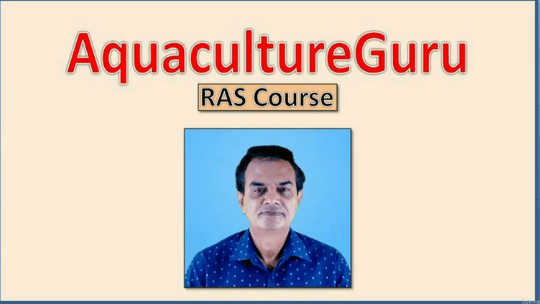
Fundamentals, Pond aquaculture vs RAS, Critical production consideration, Need for RAS, Basic RAS design, RAS advantages
Course Description
In recent years, the use of recirculating technology has given mixed results. There have been some notable large-scale business failures but numerous small to medium-scale setups continue to produce good results. Beginners, prospective aqua-culturists, and investors need to be aware of the basic technical and economic risks involved in this type of aquaculture production technology. This presentation and a few more in this series are designed to provide basic information on recirculating aquaculture technology.
This course will tell about the importance of Recirculating Aquaculture System (RAS) over the pond aquaculture, enumerate required water parameters (dissolve oxygen, ammonia, nitrite, carbon dioxide, pH, alkalinity, temperature, nitrate.), and the importance of pelletized feed under critical production considerations, need for RAS, recirculating system designs – the four basic operations which are indispensable for any RAS. Components and units for solid waste removal, TAN removal, dissolved oxygen, sanitation practices, and pH and alkalinity.
This course gives a complete understanding of RAS, to begin with in a very simple and presentable way so that even a novice can very well be aware of the facts and necessary inputs and the onward journey to learn more about the technology enables recirculating aquaculture system will certainly continue to ease on progressively.
4. Aquaponic Gardening: Growing Fish and Vegetables Together
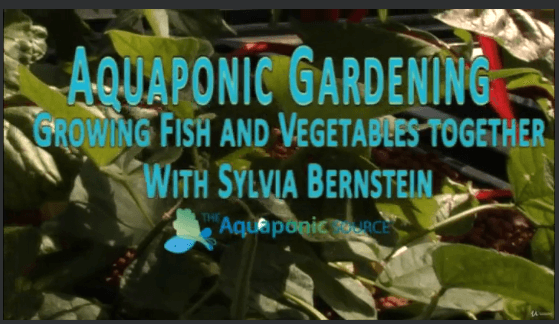
Course Description
Most of the lectures in this Aquaponic Tutorial are what is called a Video / Presentation Mashup at Udemy. What that means is that you will see a video of myself or Alan (my husband and partner) talking and demonstrating on the left, and PowerPoint slides on the right with details to keep the concepts straight. But you don’t need to do anything – the slides will just appear at the correct time!
The lectures end with some handy tracking sheets and a list of links to many of the products that are shown in the course. Some other resources that will prove useful as you embark on your aquaponic journey are…
· The Aquaponic Source – our company site and shopping site for all your aquaponic gardening needs
· The Aquaponic Gardening Community – a thriving online community of gardeners just like you who help each other learn and grow
· Aquaponic Gardening Book
· Aquaponics Association – a wonderful resource for promoting aquaponics. They also put on the annual Aquaponics Association Conference.
5. Aquaculture 4.0 – The Impact of Industry 4.0 on Aquaculture
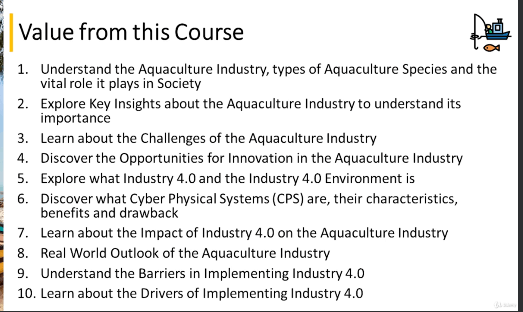
Understand how the Aquaculture Industry is being disrupted in Industry 4.0
Course Description
Welcome to the forefront of technological evolution in manufacturing and beyond – welcome to the ‘Aquaculture 4.0 – The Impact of Industry 4.0 on the Aquaculture Industry’ course! In an era marked by unprecedented advancements in digitalization, connectivity, and automation, Industry 4.0 represents a paradigm shift that is reshaping the way we conceive, design, and operate industrial systems.
Industry 4.0, often referred to as the fourth industrial revolution, is characterized by the integration of smart technologies, data-driven decision-making, and the seamless interconnection of machines and processes.
This course is designed to be your gateway into this transformative landscape, providing a comprehensive exploration of the principles, technologies, and applications that define Industry 4.0.
A course with a simple and comprehensive beginner’s guide to “Aquaculture 4.0 – The Aquaculture Industry in Industry 4.0”!
In this course, there are NINE sections which cover over 70 lectures worth over 6 HOURS of content;
6. Biofloc Aquaculture System- Basic
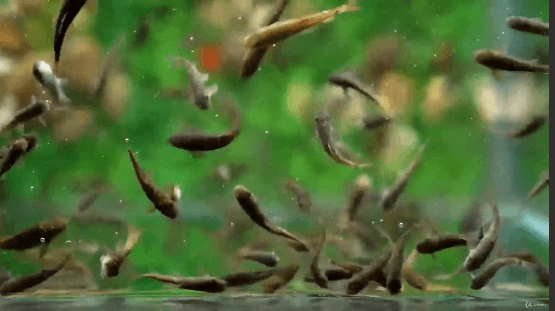
Learn Basics about Biofloc System
Course Description
This course will give you basic knowledge about the Biofloc system, and how to set up and manage the system.
This course also tries to cover as many quarries as come to your mind. The course is designed in such a way it is easy to understand for a layperson. We tried to put more practical experience into the course rather than a bookish knowledge though we referred to a lot of research papers and literature on Biofloc technology to rectify and co-relate our findings.
Who this aquaculture course is for:
- Anybody with an interest in Aquaculture and wants to evaluate the Biofloc system.
7. Recirculating Aquaculture Systems For Fish Farm
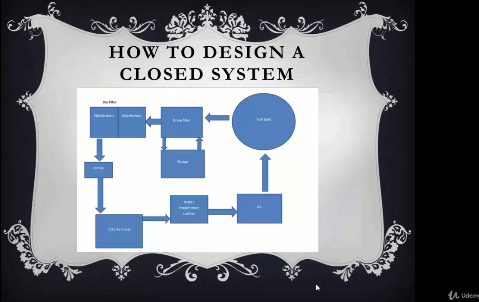
How to design your recirculating aquaculture systems for a fish farm
Aquaculture Course Description
In this course, we will explain how to design systems for fish farms, Recirculating Aquaculture Systems, and Fish density. We shall also look at, Drum Filter, Biological Filter, CO2 Filter, Air pump size, and water pump size.
We shall dive more into Biofloc and how It Work? What Fish Kind Can Live In Biofloc. How To Make Biofloc Fish Farm and How To Manage It.
Who this Aquaculture course is for:
- Anyone who wants to learn how to build a fish farm
8. Beginners Guide to Modern Farming Techniques
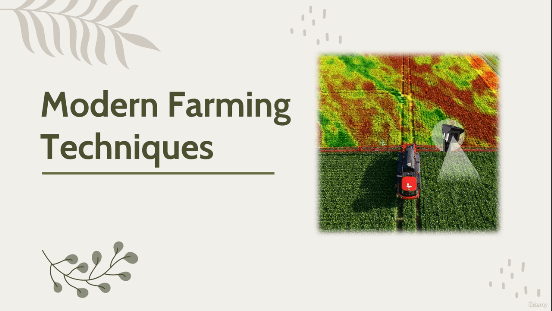
Precision Farming, Aquaculture, Drip Irrigation, No-Till Farming, Vertical Farming & Aquaponics
Course Descriptions
Welcome to the course on ”Modern Farming Techniques” where you’ll embark on a journey to discover innovative and sustainable methods that are reshaping the agriculture industry.
Whether you’re an aspiring farmer, an agriculture enthusiast, or a seasoned professional looking to update your skills, this course will equip you with the knowledge and tools to thrive in the evolving world of farming.
In this course, you’ll delve into a wide range of topics that cover the latest advancements in agriculture, designed to boost productivity, optimize resource utilization, and minimize environmental impact.
From precision agriculture and agrotechnology to organic practices and vertical farming, you’ll gain insights into the cutting-edge methods that are shaping the future of food production.
9. Recirculating Aquaculture System – Solid Waste Management
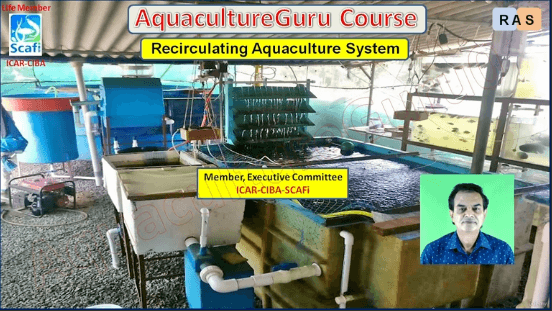
Aquaculture Course Description
Recirculating aquaculture systems (RAS) have emerged as a highly efficient and environmentally sustainable method of fish farming. In these closed-loop systems, water is continuously recycled and treated to create a controlled environment for aquatic organisms.
A key aspect of maintaining the health and efficiency of RAS is the implementation of effective solid waste management strategies.
This course explores the importance of solid waste management in a successful RAS, examining the challenges, methods, and benefits associated with responsible waste handling.
Solid waste in RAS primarily consists of uneaten feed, feces, and other organic and inorganic particles that accumulate in the water. If not managed properly, these solids can degrade water quality, negatively impacting the health of the cultured species.
Challenges in solid waste management in RAS include the need to address different types of waste, prevent clogging of filtration systems, and minimize the environmental impact of waste disposal.
10. Saltwater Aquarium 101: How to set up a saltwater aquarium
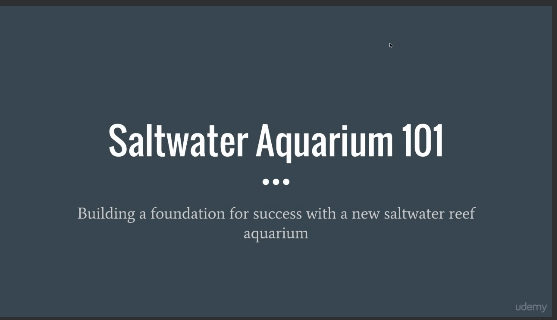
A guide to setting up and maintaining a thriving saltwater aquarium
Course Description
Saltwater Aquarium 101 is a great introduction to the concepts and strategies for starting a saltwater aquarium and is intended for:
- Anyone who has not previously set up a saltwater aquarium, or
- Anyone who has had some challenges with their saltwater aquarium in the past, or
- If you have had success with keeping a freshwater aquarium and you want to know what it takes to convert to saltwater
Who is this not for? This course is not the best option if you are looking to learn the most advanced concepts in reef keeping.
Saltwater Aquarium 101 is a combination of video lectures and downloadable workbook assignments developed to help you apply what you learn and build the habits that will help you achieve success with your tank.
Get your hands wet and get started right away!
11. How to Set Up Biofloc System For Fish Farm
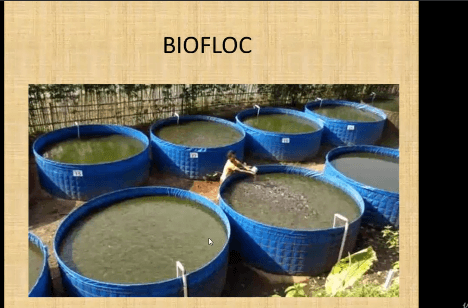
How to Set Up Biofloc System For Fish Farm
Course Description
Need to make a system and afraid of the cost? Afraid of losing your money on a system gives you just a little bit weight of fish and spends a lot of food to feed your fish? Do you want to get big fish in a short time? Do you want to Reduce fish food and get better results? Are you worry about changing the water?
In this course, we will explain how to design systems for fish farm Biofloc and how It Works?. How to Set Up Biofloc System For Fish Farm and How To Manage It.
Who this Aquaculture course is for:
- Everyone is interested in fish.
12. Mastering Asian Seabass Grow Out: Proven Techniques for RAS
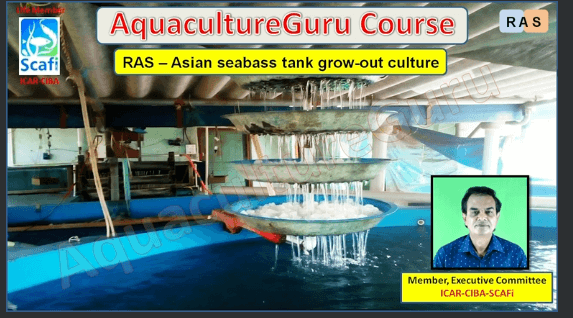
Step by Step Guide; RAS; Asian seabass biology; Feed and Nutrition; Disease Management; RAS grow out tank technology
Course Description
In this course, we embark on a journey to explore the intricacies of Asian Seabass grow-out culture, with a special focus on the revolutionary Recirculating Aquaculture System (RAS) technology.
Aquaculture has emerged as a vital solution to meet the growing global demand for fish food while alleviating pressure on wild fish stocks.
Within this dynamic industry, Asian Seabass, also known as Barramundi or Lates calcarifer, stands out as a prized species due to its delicious taste, rapid growth, and adaptability to various environmental conditions.
However, traditional aquaculture methods often face challenges such as water pollution, disease outbreaks, and limited space utilization. Enter RAS technology – a game-changer that offers a sustainable and efficient approach to fish farming. By mimicking natural aquatic ecosystems, RAS enables precise control over water quality parameters, leading to healthier fish and minimizing environmental impact.
In this course, we delve into the fundamentals of the 25 cubic meters Asian Seabass grow-out culture within RAS systems, providing a comprehensive understanding of the techniques, principles, and best practices involved.
Whether you’re a seasoned aqua-culturist looking to expand your knowledge or a newcomer intrigued by the potential of RAS technology, this course offers valuable insights for all levels of expertise.
13. School of Fish SWIMMING ESSENTIALS – Courses 1 and 2
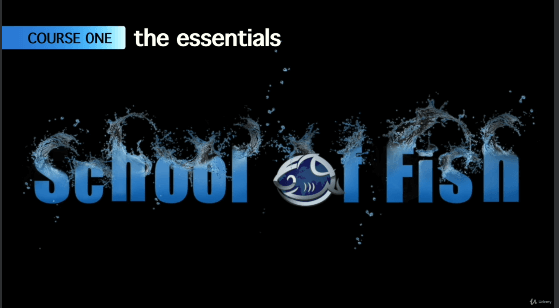
Learn the Building Blocks for all swimming strokes and skills with the first three levels: Starfish, Seahorse & Seal
Description
This is the first of two courses that are taught through the School of Fish swimming method. Course 1 focuses on the building blocks needed for a beginner through the Starfish, Seahorse, and Seal Levels.
The School of Fish progression (Course 1&2) looks at the learning and teaching in its entirety from a non-swimmer with no water confidence right through to an efficient swimmer mastering all strokes. What sets this approach apart is that the swimming strokes are introduced at different levels and then built in conjunction with each other rather than separately.
All videos include faults, how to recognize them, and how to fix them. The School of Fish method is extremely useful for any swimmer, teacher, and parent wanting the ‘whole picture’ when it comes to swimming.
Who this aquaculture course is for
- Parents, teachers, and swimmers wanting to know the basic building blocks of learning how to swim
14. Watercolor Painting Courses
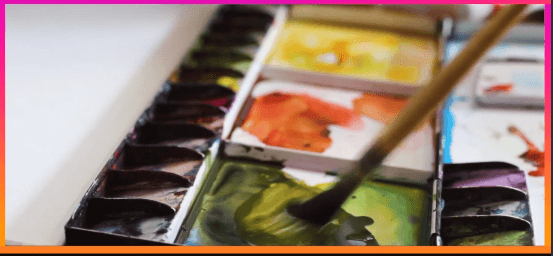
Watercolor Painting relates to Lifestyle Design
All Watercolor Painting Courses Description
Working with watercolors allows you to express your artistic sensibilities. Whether you’re interested in learning how to mix watercolor paints to achieve the right tones, or master new brush strokes for landscapes or portraits, Udemy has a top-rated course for you.
15. The Essential Guide to Aquaculture Industry
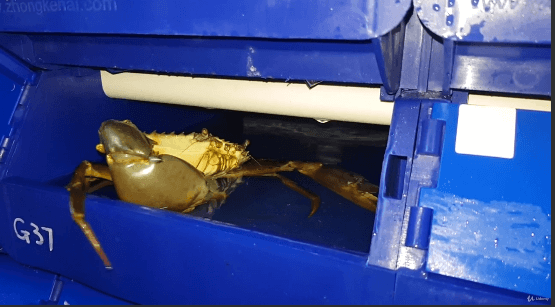
Introduction to traditional aquaculture concepts, and new technologies like RAS and BIOFLOC
Aquaculture Course Description
Aquaculture has been developed for more than a decade aiming for sustainable seafood production. There are many animals and plants involved in aquaculture production, including fish, shrimp, crab, and seaweed. As the demand for seafood and aquatic products has increased together with the increasing world population, aquaculture can be a good business to look into. Furthermore, there is also an introduction to new technology that has been developed to help the farmers. However, before venturing into aquaculture, there are many aspects to be considered and understood in the first place.
The course consists of 9 sections which include a general introduction to aquaculture type, intensity, and water quality part to help you understand.
This general understanding is crucial to avoid massive losses during the farming period. This course is basically designed to help participants to gain knowledge of the aquaculture concept and technology.
Conclusion
All the 15 best aquaculture courses are carefully selected from the Udemy learning platform. Udemy is a popular learning platform for almost all sectors. You can enroll in any of the 15 best aquaculture courses from any part of the world.
Just click on any of the links to any aquaculture course that interests you, read more, and enroll. You shall never regret enrolling in the courses. This shall help you to be successful in your fish farming or aquaculture business.
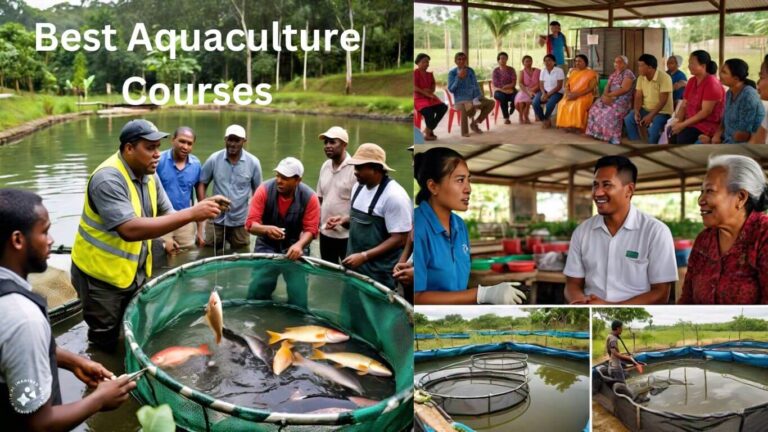
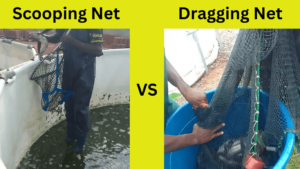
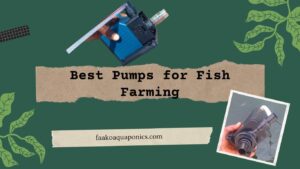
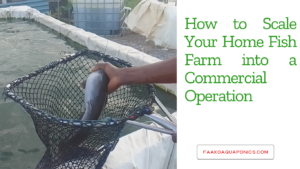
It’s really a cool and useful piece of information I’m glad that you shared this useful info withus Please stay us up to date like this Thank you for sharing
[…] out this post on the 15 best aquaculture courses. You will understand better how people set up their courses on Udemy and you can replicate the […]
Please, I only like to have answer from articles expert/s. -Can you get penalized in search engines for submitting the same articles to multiple article submmision websites?. -What should I do to claim the copyright of my article/s? Should I post it on my website first before submit it to those websites? Will search engines consider the article content as duplicated ?. Thanks heap in advance!.